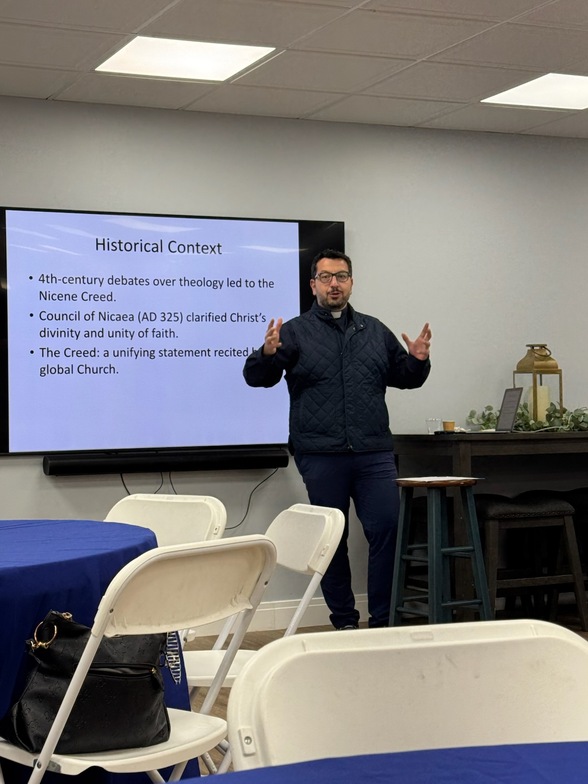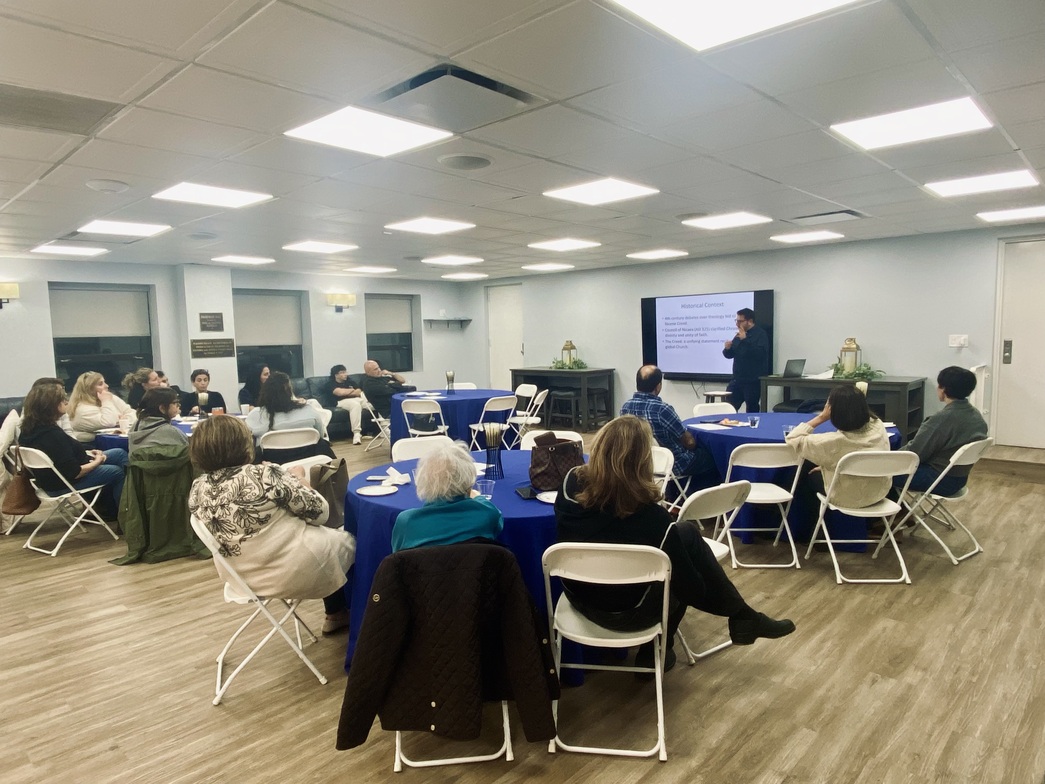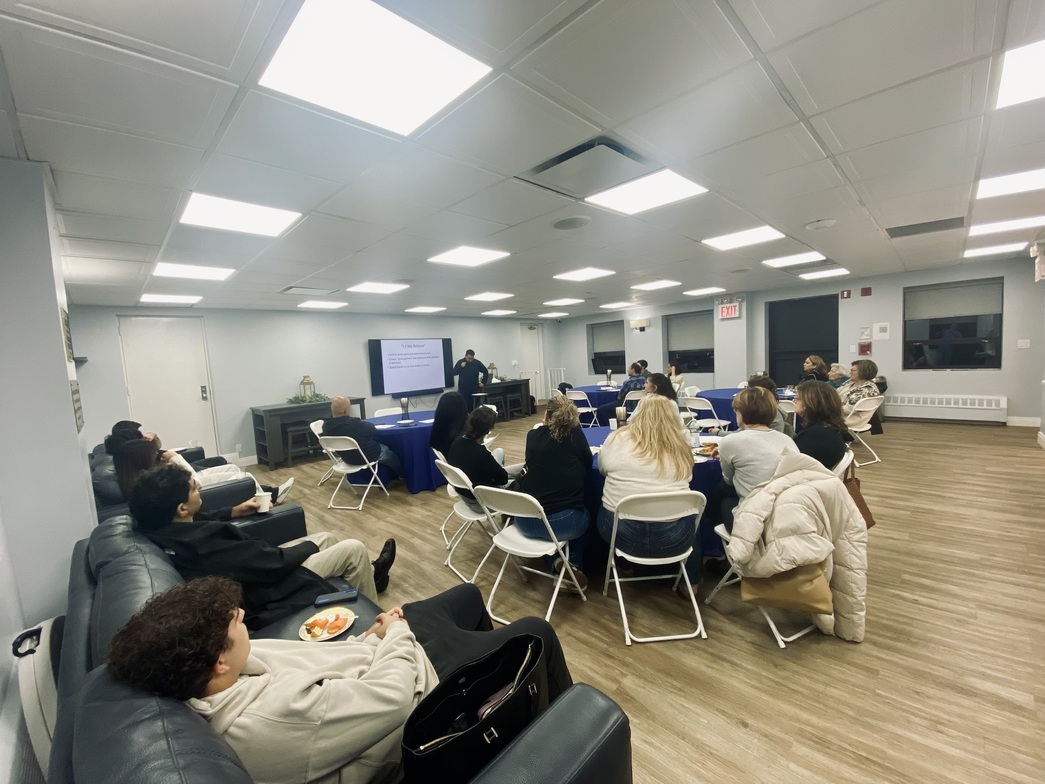Pagoumian Hall, October 21, 2025
On Tuesday evening, parishioners and friends gathered in the Pagoumian Hall of St. Sarkis Armenian Apostolic Church for the first lecture in a three-part series on the Nicene Creed, delivered by Rev. Fr. Nareg Terterian. The presentation marked the beginning of a special educational journey held in observance of the 1700th anniversary of the Creed (325–2025), a profession of faith that continues to shape the life and worship of the universal Church.
Exploring the Origins of the Creed
Fr. Nareg opened the evening by situating the Nicene Creed in its historical context. “There are not many things in our faith that are 1700 years old and still recited every Sunday,” he noted. The Creed, he explained, predates even the finalization of the New Testament canon, which occurred several decades later in the fourth century.
The lecture traced the expansion of early Christianity from Jerusalem to Antioch, Asia Minor, Rome, and Egypt, leading to the theological debates that culminated in the Council of Nicaea (A.D. 325). Fr. Nareg recounted how the priest Arius of Alexandria sparked controversy by claiming that “there was a time when the Son was not.” Opposing him was St. Athanasius of Alexandria, who defended the orthodox belief in the eternal divinity of Christ.
When Emperor Constantine the Great sought to unify his empire, he convened the Council of Nicaea, where bishops from across the Christian world, including Aristakes, the son of St. Gregory the Illuminator, representing the Armenian Church, gathered to affirm the faith that “the Son of God is of one essence with the Father.”
From History to Theology
Having established the historical setting, Fr. Nareg turned to the meaning of belief itself. He contrasted ancient communal faith with modern individualism, emphasizing that Christianity has always been a shared, communal experience. “‘We believe,’ not ‘I believe,’ is how our Church begins the Creed,” he explained, “because faith grows within the community of believers.”
He guided the audience through the structure of the Divine Liturgy, noting that the Creed appears immediately after the proclamation of Scripture, “our response to God’s Word.” Each reading and prayer, he said, prepares the faithful to affirm: “Yes, we believe; this is our faith.”
Faith and Reason
Addressing the frequent misconception that faith and reason are at odds, Fr. Nareg spoke about faith as “supra-rational”, beyond, but never beneath, reason. Drawing on thinkers such as St. Thomas Aquinas and John Henry Newman, he described faith as “the reasoning of a religious mind.”
He offered vivid illustrations: while the scientific method helps us understand measurable realities, it cannot grasp love, beauty, or meaning. Likewise, belief in God is not blind acceptance but trust in divine revelation, grounded in the coherence of creation itself.
Creation, Evil, and Mystery
The presentation moved seamlessly from theology to reflection. Fr. Nareg reminded the audience that God is existence itself, ‘I AM WHO I AM’, the source of all being. Creation, he said, is not an event of the distant past but a continuous act of divine love, sustained “as a singer sustains a song.”
When addressing the problem of evil, he acknowledged the challenge of reconciling suffering with faith. “Evil is not a power equal to God,” he said. “It is the absence of good. Even in the midst of pain, we are never alone, for God unites Himself with our suffering through the Cross of Christ.”
Faith as a Journey
Throughout the lecture, Fr. Nareg invited participants to view belief as an ongoing journey, a movement toward the Divine Mystery. He reflected on the Gospel story of the woman healed by touching the fringe of Jesus’ garment: “Her faith transformed her from a marginalized stranger into a daughter. Faith has that power; it heals and restores.”
The Creed as Living Prayer
In closing, Fr. Nareg emphasized that the Nicene Creed is not merely a relic of history but a living confession recited in every Divine Liturgy. Each Sunday, as the faithful proclaim “We believe,” they join the voices of generations past in a single act of worship that bridges history, theology, and spiritual life.
The evening concluded with reciting The Nicene Creed and an invitation to return for the following sessions, next week’s guest lecture, V. Rev. Fr. Boghos Tinkjian, and a final presentation by Fr. Nareg exploring the concluding articles of the Creed.
The Nicene Creed Lecture Series continues on Tuesday evenings at 7:30 p.m. in the Pagoumian Hall of St. Sarkis Armenian Apostolic Church, Douglaston, NY. All are welcome.






